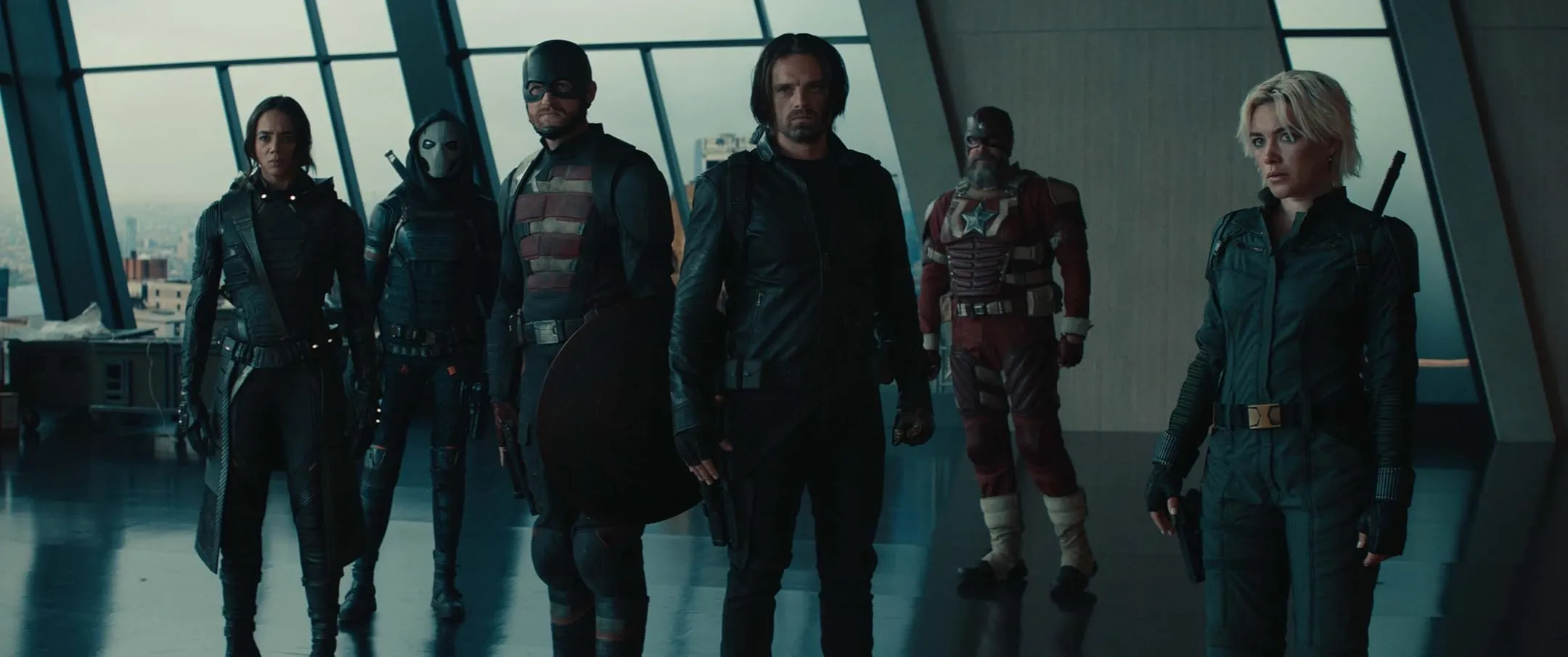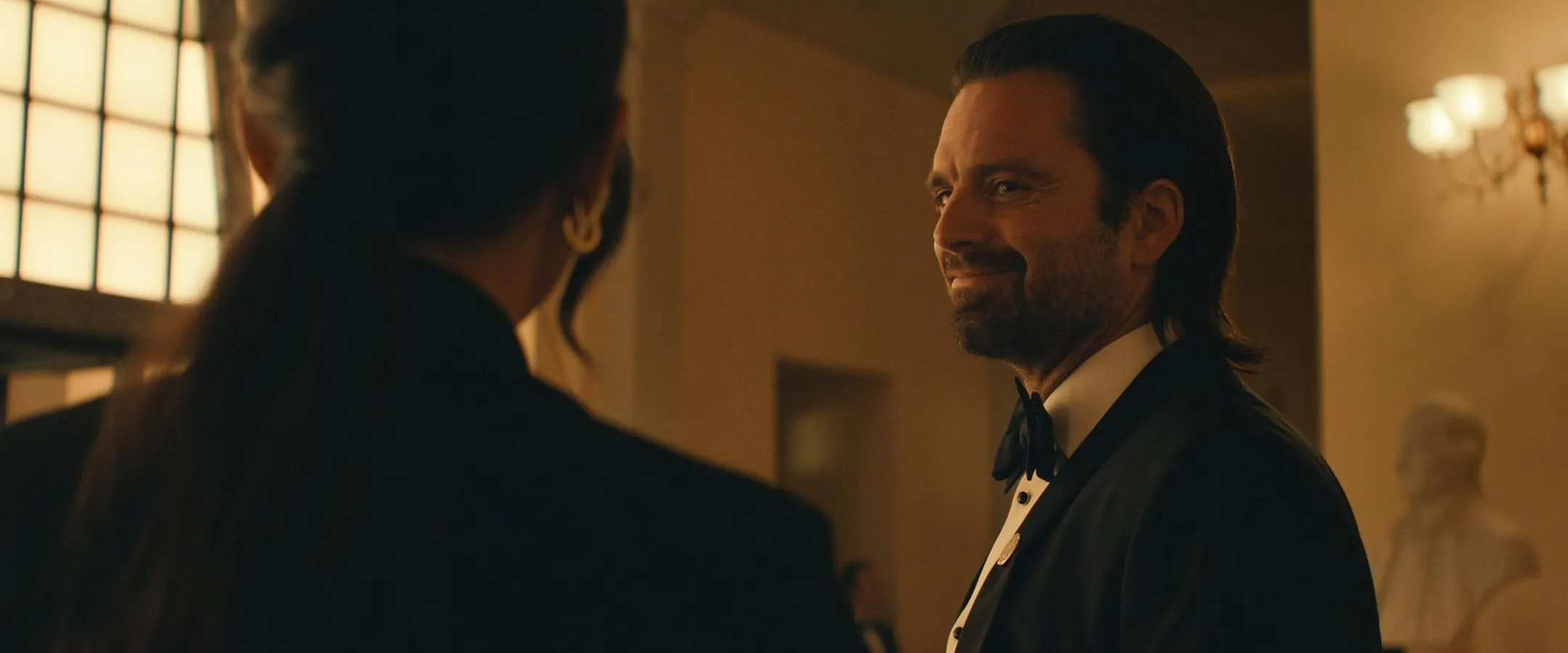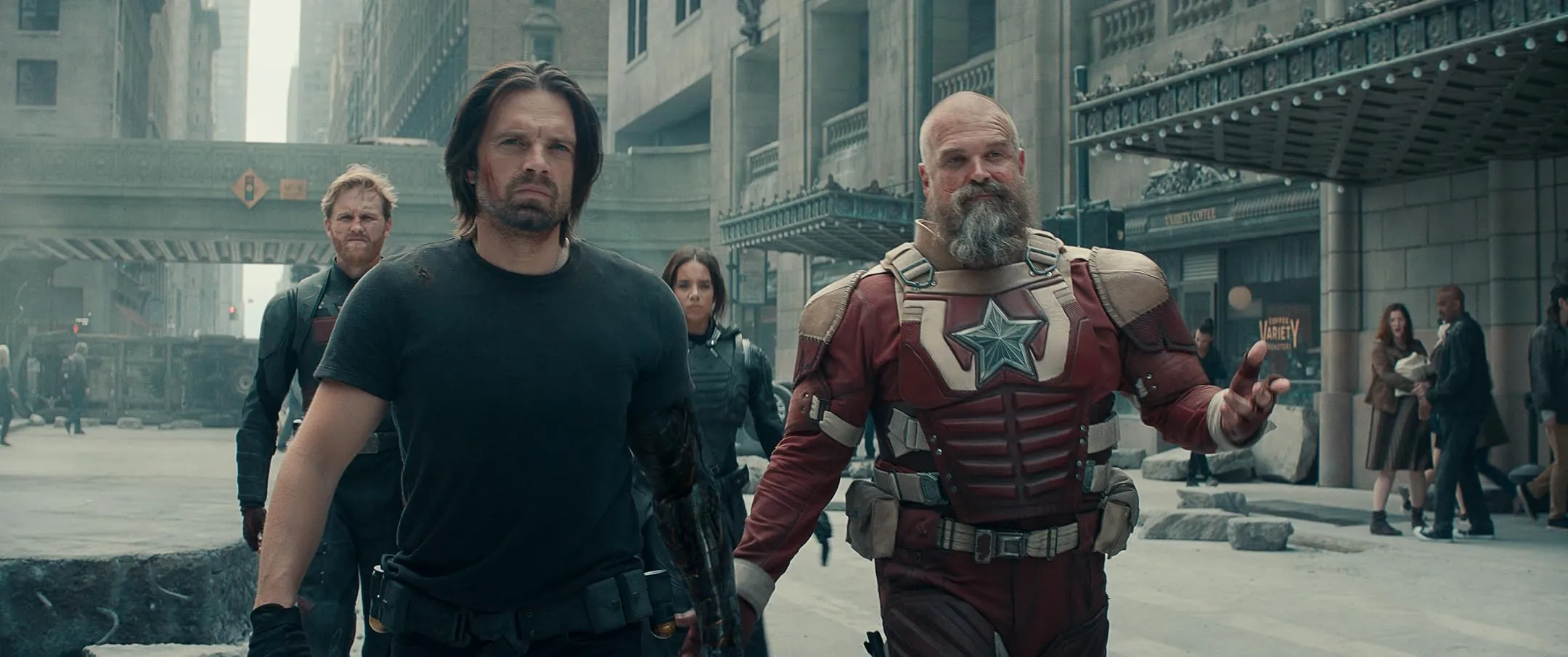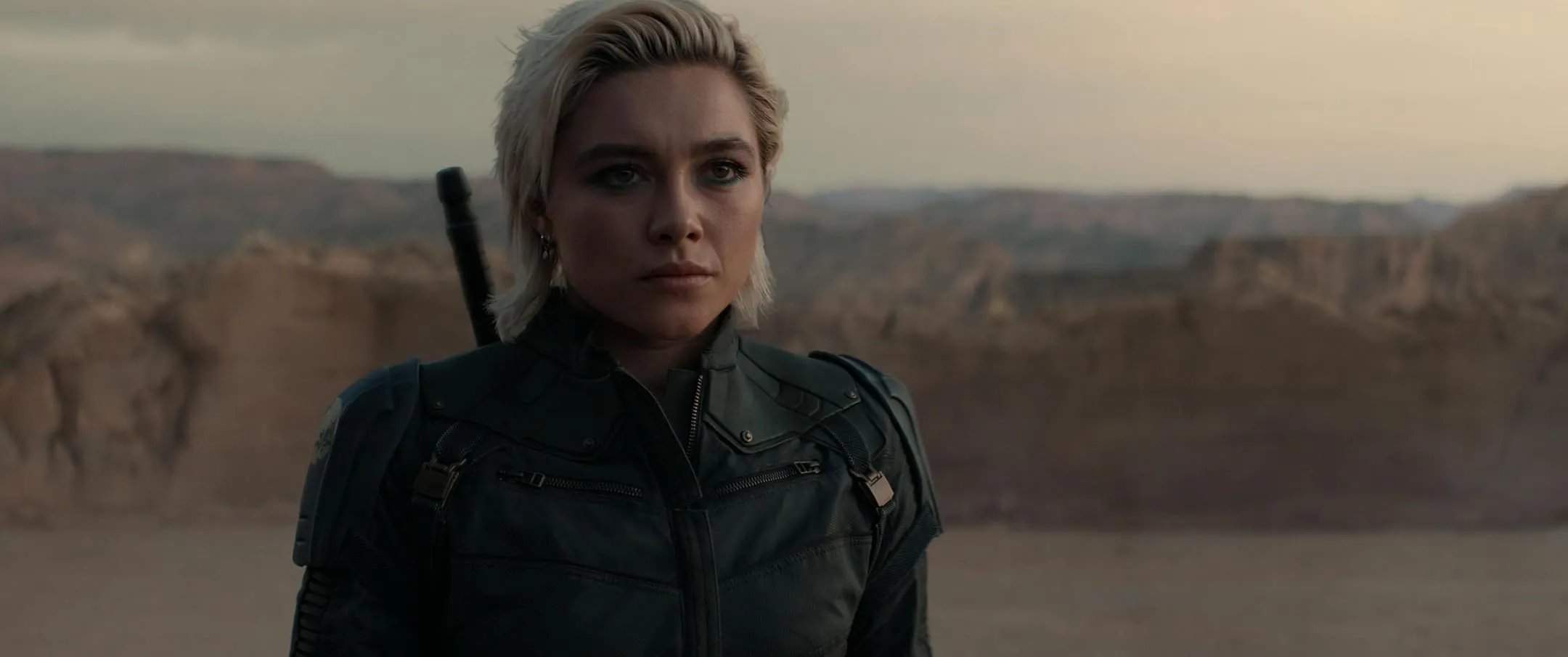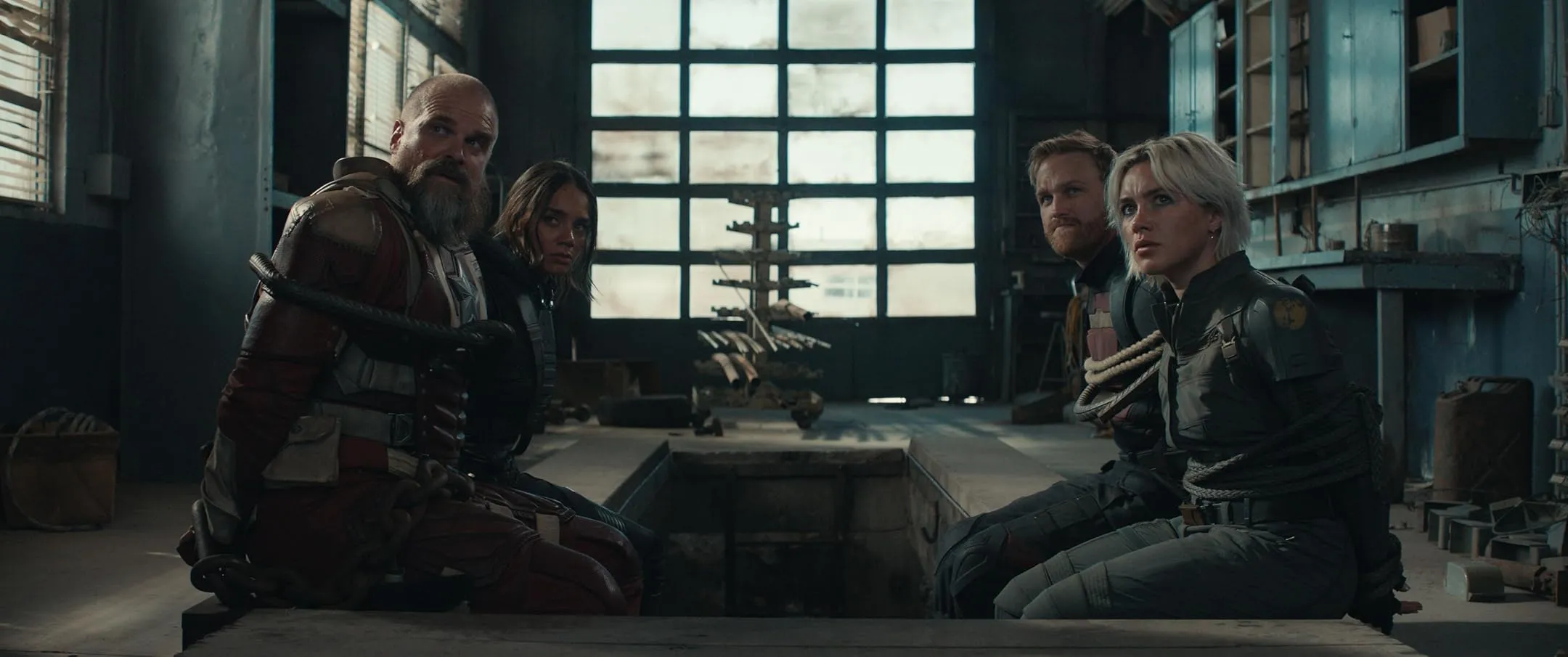Thunderbolts stands as a peculiar entry in the ever-expanding MCU, mixing elements of superhero bravado with moments of intense introspection. The film introduces a ragtag collection of antiheroes who find themselves drawn together under the manipulative hand of CIA director Valentina Allegra de Fontaine (Julia Louis-Dreyfus). These characters, often discarded or overlooked in previous installments of the Marvel franchise, are given a second shot at redemption—or at least survival—through the lens of a high-stakes mission that will test both their physical and emotional limits.
At the heart of the narrative is a profound exploration of trauma, mental health, and the concept of heroism, notably through the characters of Yelena Belova (Florence Pugh) and Bob (Lewis Pullman). Yelena, the former child assassin, wrestles with the hollow legacy of her violent upbringing, while Bob, an amnesiac with a fractured sense of self, serves as a tragic mirror to her pain. Together, they forge an uneasy alliance with the likes of John Walker (Wyatt Russell) and Alexei Shostakov (David Harbour), all of whom have their own emotional baggage and motivations.
But Thunderbolts is not just a tale of superheroes finding redemption. It’s about the struggle to find meaning within a world that often reduces its individuals to mere tools or weapons. The ragged crew becomes a microcosm of the broader social discourse on mental health, addiction, and societal expectations. While they might not have the polished polish of Avengers-level heroes, there’s a certain rawness here—a resonance with a modern audience that’s often disillusioned by the hyper-polished, formulaic narratives of traditional superhero films.
This is where the film’s intellectual core resides, and perhaps its most telling contribution to the MCU. It asks: What does it mean to be a hero, when so much of your existence has been defined by others as a weapon or a failure?
A Misfit Symphony: Character Dynamics in Thunderbolts
In Thunderbolts, the characters are as fragmented as the world they inhabit. At the center of it all is Yelena Belova (Florence Pugh), a former assassin trying to unlearn a lifetime of violence and find meaning in a universe that has long reduced her to a mere tool. Pugh plays Yelena with a rawness that cuts through the film’s more overt action sequences. She’s the most fully realized character in this ensemble, embodying a struggle not just with external foes but with her own inner demons.
Her arc—an attempt to break free from her past—becomes the emotional backbone of the film. She isn’t just looking for redemption, but for the right to feel something at all, as if her assassin skills could somehow be recontextualized as a way to heal rather than harm. The delicate balance between her vulnerability and her lethal abilities is what gives Yelena the gravity to anchor the team, especially in her fraught relationship with Bob (Lewis Pullman).
The two characters form a surprising emotional tether, where Yelena’s latent compassion meets Bob’s self-destructive tendencies. Their interaction feels like a delicate dance of mutual understanding—a bond forged in trauma and, perhaps, in the hope that even the most broken of people can find something worth saving.
Enter John Walker (Wyatt Russell) and Ghost (Hannah John-Kamen), two figures who, for all their potential, never quite reach the heights their backstories suggest. Walker, the disgraced former Captain America, is a walking embodiment of America’s obsession with misplaced heroism and unchecked ego.
In contrast to Yelena’s emotional depth, Walker’s arc feels superficial—he’s an easy punchline, defined more by his failures than any sense of growth. Ghost, meanwhile, occupies a similarly troubled space. Initially presented as a potential character of great complexity, she ends up feeling like a cool visual effect with little emotional substance to back it up. Their comedic back-and-forth with Yelena is entertaining but doesn’t add much to their development, giving the sense that both characters are more plot devices than true individuals.
Bob (Lewis Pullman), the troubled amnesiac who’s thrust into the chaos of the Thunderbolts, proves to be the emotional and philosophical mirror to Yelena’s character. Bob’s journey from vulnerability to a dark, almost apocalyptic power mirrors the film’s thematic exploration of trauma and mental illness.
His character challenges the very notion of strength, suggesting that real power might come from confronting, rather than escaping, one’s inner torment. In contrast to the more action-focused characters around him, Bob’s fragility becomes the film’s silent weapon—a poignant reminder of the real demons these characters are fighting, even when they’re not on the battlefield.
David Harbour’s Red Guardian is the film’s comic relief and heart, a former super-soldier now relegated to running a limo service. The humor in Harbour’s performance works because it’s rooted in genuine affection. Red Guardian’s boisterous attempts at fatherhood—particularly his oddball relationship with Yelena—bring levity without detracting from the film’s more somber elements. It’s a necessary counterbalance to the more intense emotional moments, providing the audience with brief but welcome moments of warmth.
Other supporting characters, like Bucky Barnes (Sebastian Stan) and Valentina Allegra de Fontaine (Julia Louis-Dreyfus), round out the ensemble. Bucky’s role in the film, though critical, feels like an afterthought in comparison to the emotional depth of the primary cast.
His presence is a reminder of the Avengers era, but his arc remains stagnant—an attempt at relevance rather than meaningful development. Meanwhile, Valentina, with her political scheming, provides a cold, calculating antagonist whose role is primarily to push the plot forward. Though her manipulative ways serve as a driving force, she never rises beyond the level of an opportunistic villain.
The cast of Thunderbolts functions like an orchestra of misfits—each character plays a part, but not all reach their full potential. Yet it’s in this imperfect harmony that the film finds its strength, and in their collective struggle, we catch a glimpse of the very real human condition—fractured, bruised, but still striving for something more.
Jake Schreier’s Touch: A Breathing Space in the MCU
Jake Schreier’s Thunderbolts feels like a hesitant step away from the MCU’s familiar cacophony of hyper-kinetic spectacle and apocalyptic stakes. The director, known for his work on Robot & Frank and Beef, brings a different sensibility to the franchise—less interested in world-shattering showdowns and more attuned to the quiet moments where characters fumble, clash, and perhaps grow. His handling of the narrative is distinctly layered, introducing darker themes of trauma and redemption, yet consistently weaving in comedic beats, not for relief but as a subtle commentary on the absurdity of heroism itself.
Where most MCU films ramp up to inevitable climaxes of chaos, Thunderbolts plays its cards close to the chest. It’s not that Schreier avoids spectacle—he simply places it in service of the characters, rather than the other way around. With a film about misfit antiheroes, it’s almost a given that they won’t immediately cohere into a well-oiled machine.
The awkwardness, the vulnerability, even the dark humor they exude are not distractions but the film’s true focal point. This thematic shift speaks to Schreier’s background in smaller, character-driven stories, where nuance often outweighs the need for bombast (after all, who expected the director of Beef to take on a superhero movie?).
Andrew Droz Palermo’s cinematography further enforces this shift. The visual language in Thunderbolts often feels like it’s peeling away the glossy exterior we’ve come to expect from superhero films. In particular, the opening hallway fight is shot with such shadow and stark overhead angles that it almost becomes a meditation on isolation rather than just a moment of violence.
The low-key lighting and stark shadows don’t just reflect the film’s dark themes—they become a manifestation of its characters’ internal turmoil. They are, in essence, trapped within their own psychological labyrinths, and the cinematography cleverly emphasizes this internal landscape.
In Thunderbolts, the genre is purposefully skewed. The film isn’t concerned with delivering the usual high-flying superhero spectacle but instead dissects the flawed and fractured psyches of its characters. The juxtaposition between trauma and heroism becomes the true battleground, not some faceless villain or monstrous force. This self-reflection on the MCU’s trajectory is not only refreshing but necessary, positioning Thunderbolts as both a continuation and a pointed critique of the superhero genre itself.
Redemption, Trauma, and the Misfit Heroism of Thunderbolts
Thunderbolts presents a narrative that examines the shadowy edges of heroism—where the line between redemption and self-destruction often blurs. The film assembles a team of antiheroes who are neither saviors nor villains but something in between, fractured and scarred by their pasts. Each character is tethered to their own moral failings, carrying a burden of guilt, regret, and self-loathing that is almost palpable.
Yelena Belova (Florence Pugh), the highly trained assassin, embodies this tension with stunning complexity. Her journey is one of survival, but more importantly, a fight for self-acceptance. Her past, one of violence and manipulation, continues to haunt her—a ghost she can’t outrun, no matter how many lives she saves. Redemption for Yelena is not a grand gesture but an ongoing process, marked by tentative steps toward emotional honesty and connection with those around her, especially Bob.
Bob (Lewis Pullman), in turn, represents a darker, more tragic version of this redemption arc. His character, an amnesiac meth addict turned unwilling superhero, is an unsettling reminder of how trauma—both physical and psychological—can manifest in destructive ways. Bob’s journey is not one of active heroism but of passive survival: he is a character who does not even remember who he is, yet the very act of remembering becomes a path to self-revelation. The scenes of Bob confronting his past—his addiction, his breakdown—serve as the film’s emotional heart, and through his tortured introspection, Thunderbolts raises a question that lingers: Can one truly redeem themselves when the past is so fractured and incomprehensible?
The film’s handling of mental health and trauma is both direct and nuanced. The “interconnected shame rooms,” where characters are forced to face their personal demons, symbolize not only their internal struggles but also how society often traps its most vulnerable in cycles of self-doubt and alienation. The sequences that delve into these traumas are harrowing but never overbearing, balancing the weight of their themes with moments of levity, often at the expense of the team’s misguided efforts at camaraderie.
This tonal shift—oscillating between dark introspection and sharp, snappy humor—reinforces the film’s stance that even heroes must grapple with their inner darkness. It is a delicate line, where the humor becomes not a way to avoid the pain but a coping mechanism, a defense against the suffocating weight of their own flaws.
At its core, Thunderbolts is an interrogation of what it means to be a hero. The team’s attempts at heroism are both earnest and flawed. They are not bound by the conventional superhero narrative of supreme power; instead, they succeed because they are forced to support each other in ways that the typical, polished MCU heroes rarely do. Yelena, Bob, Red Guardian (David Harbour), and the others are all damaged, but in their damaged state, they create a new definition of heroism.
It’s not about infallible strength or invulnerability, but about facing each other’s vulnerabilities, lifting one another up through shared struggle. The film asks whether it’s possible to be a hero when you’re as broken as the world you’re trying to save—and offers the tentative, hopeful answer that perhaps it’s not in spite of your flaws, but because of them, that true heroism is born.
Action and Visuals: A Gripping, Grounded Approach to Heroism
The action sequences in Thunderbolts are a far cry from the CGI-heavy, universe-shaking battles we’ve come to expect from the MCU. The film leans into a more grounded, tactile approach, with the opening hallway fight sequence serving as a prime example. Shot with stark overhead angles, this scene is as much about Yelena’s emotional isolation as it is about physical combat.
The choreography here isn’t about spectacle but about the raw, almost desperate energy of someone battling their own disillusionment. There’s a quiet intensity in the way these characters fight—not for glory, but to survive, to prove to themselves that they are still worth something. It’s a far more intimate kind of violence than we’re used to in superhero films, where the stakes are often elevated to cosmic proportions. This shift makes the action feel more personal, as though the outcome of every fight matters not just for the plot but for the characters’ internal journeys.
Visually, the film stands apart from the usual MCU fare. The cinematography, led by Andrew Droz Palermo, bathes scenes in shadows and cool tones, creating an atmosphere that feels more like a noir thriller than a traditional superhero spectacle. This use of lighting does more than establish mood; it becomes a reflection of the characters’ inner turmoil, particularly Yelena’s.
When the film moves into its larger set pieces, like the climactic battle, the special effects are present but never overbearing. Instead of relying on dazzling digital destruction, Thunderbolts uses effects sparingly, allowing them to serve the emotional core of the story.
For example, Bob’s powers are depicted in a way that amplifies his emotional state rather than overshadowing it. The destructive force of his abilities is framed less as a spectacle and more as a terrifying manifestation of his mental instability. This balance between action and character-driven moments is what makes Thunderbolts’ approach to visuals so compelling: it’s not just about the fight, but about what the fight represents.
The Villain and Conflict: A Machiavellian Web of Manipulation and Power
Julia Louis-Dreyfus’s portrayal of Valentina Allegra de Fontaine in Thunderbolts feels as much like a performance of cold calculation as it does an embodiment of the corrupt political machinery that churns beneath the surface of society. The character is a cynical CIA director whose ambitions stretch far beyond mere power; she is the epitome of self-interest, steering the Thunderbolts into chaos to safeguard her own position.
Louis-Dreyfus, with her characteristic sharpness, injects the role with a sense of detached amusement, as if Valentina herself is amused by the very notion of human emotion. This portrayal works not just as a personal villain but as a symbol of the systemic corruption that drives these characters—the manipulation of broken people, treating them as pawns in a greater game.
In many ways, Valentina is the inverse of the team she assembles: whereas they are victims of manipulation, she is the manipulator, a figurehead for the forces that trap them in cycles of trauma and self-doubt. Her power is not just personal but emblematic of the institutions that have failed these characters at every turn.
The central conflict of Thunderbolts evolves from a political scheme into a far more personal struggle. The initial battle with Valentina’s machinations is an external one: a fight for survival against a powerful antagonist. However, as the film progresses, the true threat reveals itself to be internal.
The conflict, much like the characters’ arcs, shifts from a struggle against an external enemy to a confrontation with one’s own past and inner darkness. Bob’s powers—an uncontrollable force linked to his trauma—become the narrative’s emotional and thematic fulcrum.
The team’s journey to protect Bob from his own destructive potential is less about stopping a villain and more about grappling with the vulnerability that comes from confronting one’s own brokenness. And in that sense, the real enemy is not Valentina, but the pervasive force of emotional damage that these characters have carried for so long.
Final Thoughts: A Step Toward Redemption for the MCU
Thunderbolts emerges as a standout entry within the MCU, not for its action-packed set pieces but for its nuanced character development and exploration of deeper, often darker themes. The film’s strength lies in how it challenges the traditional superhero formula—leaning into the messy, imperfect humanity of its antiheroes.
By focusing on trauma, mental health, and redemption, it offers something more complex than the usual cosmic stakes. The raw performances, especially from Florence Pugh and Lewis Pullman, anchor the narrative, allowing the film to explore emotional depth without losing sight of the action that keeps it within the superhero genre.
Despite its clear connection to the ever-expanding MCU, Thunderbolts feels like an attempt to carve out space for more intimate storytelling within a franchise that often leans too heavily on spectacle. While it’s not without its flaws—some character arcs feel underdeveloped and the pacing can occasionally drag—it stands as a significant, if flawed, step forward for the MCU, balancing humor and heart with genuine introspection.
Full Credits
Director: Jake Schreier
Writers: Eric Pearson, Joanna Calo, Lee Sung Jin
Producers: Kevin Feige
Cast: Florence Pugh (Yelena Belova), Sebastian Stan (Bucky Barnes), David Harbour (Alexei Shostakov / Red Guardian), Wyatt Russell (John Walker / U.S. Agent), Olga Kurylenko (Antonia Dreykov / Taskmaster), Hannah John-Kamen (Ava Starr / Ghost), Julia Louis-Dreyfus (Valentina Allegra de Fontaine), Lewis Pullman (Robert Reynolds / Sentry), Geraldine Viswanathan (Mel), Violet McGraw (Young Yelena Belova), Chris Bauer, Wendell Pierce
Director of Photography (Cinematographer): Andrew Droz Palermo
Editors: Angela M. Catanzaro, Harry Yoon
Composer: Son Lux
The Review
Thunderbolts*
Thunderbolts* is a refreshing and complex shift within the MCU, offering a grounded, emotionally resonant exploration of flawed antiheroes grappling with trauma, redemption, and self-worth. While its pacing falters at times and some character arcs are left wanting, the film’s emotional depth and fresh approach to superhero storytelling make it a notable entry. It’s not without its imperfections, but it marks a significant step for the franchise.
PROS
- Strong character development, especially for Yelena and Bob.
- Thoughtful exploration of trauma, mental health, and redemption.
- Grounded action sequences that prioritize emotional stakes over spectacle.
- Unique visual style with stark shadows and intimate cinematography.
- A refreshing tonal shift within the MCU, balancing humor with depth.
CONS
- Some character arcs feel underdeveloped, particularly for Ghost and John Walker.
- Pacing occasionally drags, especially in the middle of the film.
- The conflict sometimes feels secondary to character exploration, which may leave some viewers wanting more action.









































